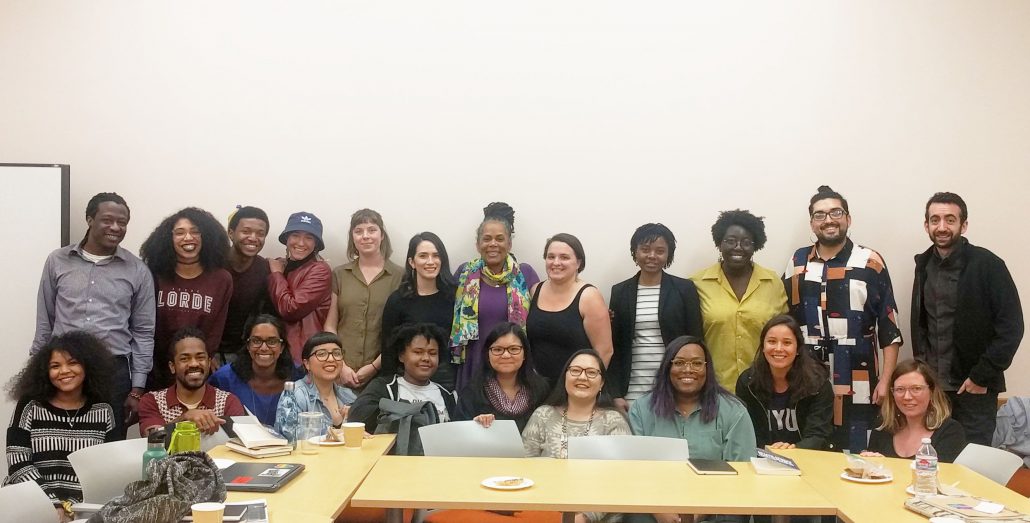What About Them: Gender-Based Violence and Prison Abolition

Professor Beth Richie (center, in purple) with UCLA students who took part in a pre-conference seminar in advance of Thinking Gender 2019: Feminists Confronting the Carceral State
By Anthony James Williams
Dr. Beth Richie led a transformative two-hour interactive student seminar prior to the 2019 Thinking Gender Conference. And over five months later, I’m still thinking about Professor Richie’s Black feminist analysis of the prison nation and how we must center gender-based violence in all of our work. Our conversation also addressed the apparent contradiction between gender-based violence and prison abolition that leads many people to ask abolitionists: what about safety from them? You know, those doing time for violent charges, rather than those incarcerated for property crime or nonviolent drug charges.
Safety concerns are valid in a country founded on European settler colonial violence. Safety concerns continue to make sense in a world where primarily cisgender and heterosexual men have consistently inflicted violence upon women, gendernonconforming people, and queer people as a sadistic power play. But unfortunately, safety concerns about them are not adequately handled by the systems under which we live today. Prisons, policing, and punitive policies are just not working.
Prison does not stop them. RAINN teaches us that only 5 out of every 1,000 rapists end up incarcerated. So even if prison did stop them, it would only stop the ones who are caught. Dr. Kimberlé Crenshaw teaches us that sexual violence against Black women results in fewer years of prison time than the same violence against Latinx and/or white women. Years of untested rape kits teach us how traumatizing and futile the process of reporting sexual assault can be. And truthfully, those abusers who are incarcerated also get out of these prisons in much worse condition than they entered. They track, stalk, and abuse their survivors. They find new survivors to antagonize. Prison does not stop them.
Prison abolition through Black feminist analysis, then, does not just address how we can stop the construction of new prisons and jails, but instead begins well before that. The systems that enable gender-based violence are upheld on both sides of the bars, by those inside and outside these institutions. So how might our world be different if we socialized our children into asking for consent where we currently push for force? How much better would our world be if we could actually have a non-violent conversation with cis men about killing trans women instead of telling women what they can and cannot wear? And how much less trauma would we have in our world if we recognized both gender and sexuality as fluid, rather than punishing those who challenge our preconceived notions?
A Black feminist analysis of the state of prison abolition today tells us that abusive college swimmers like Brock Turner and police officers like Daniel Holtzclaw do not just appear. Their parents, friends, co-workers, and so many of us make excuses for their behavior, brushing off seemingly little acts that serve as a testing ground for larger and more violent acts. And those who do call out their coddling are silenced, abused, and sometimes killed. So when someone asks “what about them,” answer: what about them? If those bars do not rehabilitate those inside and most of them are actually outside, why don’t we focus on creating a truly safer world today that focuses on reducing harm, whether we agree on if prisons should exist or not.
Visit Survived + Punished and INCITE! to learn more about some of the already existing efforts.
Anthony James Williams is a PhD Student in Sociology at UCLA. In February 2019, they took part in a pre-conference seminar with Professor Beth Richie as part of Thinking Gender 2019: Feminists Confronting the Carceral State.

